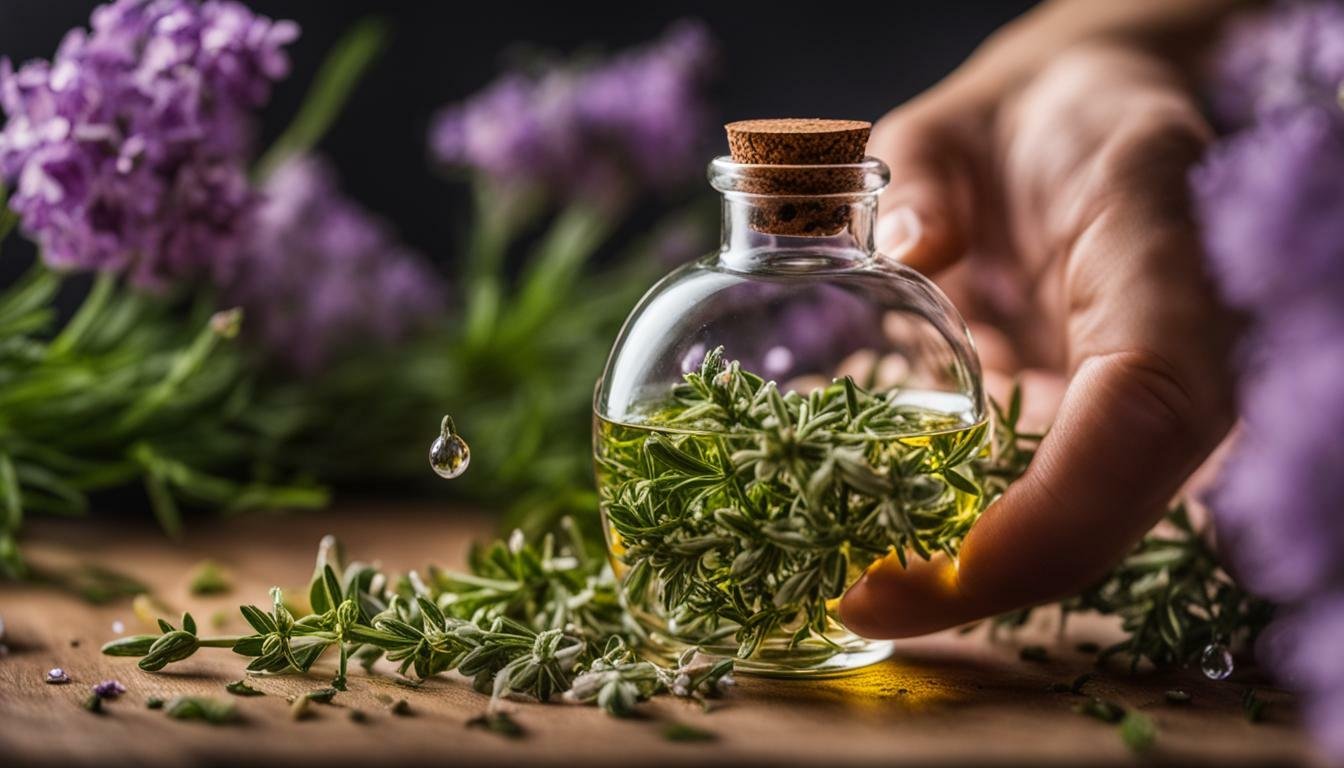Reveal What Lavender is Good For
Lavender is a versatile herb that offers numerous health benefits, making it a popular choice for various health and wellness practices. Whether used in its essential oil form or as a dried herb, lavender has been utilized for centuries for its therapeutic properties. From promoting better sleep to improving skin health, lavender has a wide range of uses that can enhance your overall well-being.
Key Points:
- Lavender can potentially improve sleep quality and help with insomnia.
- It may be effective in treating skin blemishes and promoting wound healing.
- Lavender has anti-inflammatory properties that can help reduce pain and improve respiratory health.
- It has been found to lessen menopausal hot flashes and combat fungal infections.
- Lavender has the potential to promote hair growth and maintain a healthy scalp.
Lavender for Better Sleep and Anxiety Relief
Lavender has been found to promote better sleep and help reduce anxiety, making it an ideal natural remedy for those struggling with sleep disorders or anxious thoughts. Its calming properties have been recognized for centuries, with lavender being used in various forms to improve sleep quality and alleviate symptoms of anxiety.
One of the most popular ways to enjoy the benefits of lavender for sleep is through the use of pillow sprays or linen mists. These products typically contain lavender essential oil, which can be sprayed onto your pillowcase or bedding before bedtime. The soothing scent of lavender can help relax your mind and body, creating a more conducive environment for sleep. Inhaling the aroma of lavender through aromatherapy can also have a calming effect and promote a sense of relaxation, making it easier to fall asleep and stay asleep throughout the night.
Aside from its impact on sleep, lavender has also been found to have an anxiolytic effect, which means it can help reduce symptoms of anxiety. Whether applied topically or inhaled, lavender essential oil can help alleviate feelings of stress and promote a sense of calm. Incorporating lavender into your daily routine, such as using lavender-scented candles or incorporating it into your skincare routine, may help minimize anxiety and provide a soothing effect on the mind and body.
If you’re interested in trying a DIY lavender pillow spray, here’s a simple recipe to help you get started:
Ingredients:
- 2 tablespoons of distilled water
- 1 tablespoon of witch hazel or vodka
- 10-15 drops of lavender essential oil
Instructions:
- In a small spray bottle, combine the distilled water and witch hazel or vodka.
- Add 10-15 drops of lavender essential oil to the mixture.
- Secure the cap tightly and shake well to blend the ingredients.
- Spray the lavender pillow spray onto your pillowcase or bedding before going to bed.
Experiment with the number of drops of lavender essential oil to find your preferred strength. Remember to shake the bottle before each use to distribute the oil evenly. Enjoy the calming and relaxing benefits of lavender as you prepare for a restful night’s sleep.
| Benefits of Lavender | Methods of Use |
|---|---|
| Promotes better sleep | Pillow sprays, linen mists, aromatherapy |
| Reduces symptoms of anxiety | Topical application, inhalation, lavender-scented products |
| Anxiolytic effect | Calming and soothing properties |
Lavender for Skin Health
Not only does lavender smell pleasant, but it also offers a range of benefits for the skin, such as improving the appearance of blemishes, aiding in wound healing, and reducing inflammation. Lavender’s natural antibacterial properties make it an effective remedy for treating acne and reducing the redness and swelling associated with breakouts. By applying lavender oil topically, you can help to minimize the appearance of blemishes and promote clearer, healthier-looking skin.
In addition to its acne-fighting properties, lavender can also aid in wound healing. Its anti-inflammatory and antiseptic qualities help to cleanse the skin and promote the growth of new cells, allowing wounds to heal more quickly. Whether you have a minor cut, scrape, or burn, applying lavender oil to the affected area can help to soothe and protect the skin, reducing the risk of infection and scarring.
Furthermore, lavender’s anti-inflammatory properties make it an ideal ingredient for addressing skin conditions characterized by redness and irritation. Whether you have eczema, psoriasis, or rosacea, incorporating lavender-based skincare products into your routine can help to calm and soothe inflamed skin, providing relief from itchiness and discomfort. Regular use of lavender-infused products can contribute to a healthier and more balanced complexion.
When it comes to lavender for skin health, the possibilities are endless. Whether you choose to use lavender essential oil, lavender-infused creams, or even create your own DIY skincare products, incorporating lavender into your routine can lead to noticeable improvements in the appearance and overall health of your skin.
| Lavender for Skin Health: | Benefits |
|---|---|
| Improves appearance of blemishes | Aids in wound healing |
| Reduces inflammation | Soothes irritated skin |
| Calms skin conditions (eczema, psoriasis, rosacea) | Provides relief from itchiness |
As with any skincare product, it’s important to perform a patch test before using lavender topically to ensure that you do not have an adverse reaction. While lavender is generally considered safe for most people, it’s always best to consult with a dermatologist or healthcare professional if you have any underlying skin conditions or concerns.
Takeaway: Lavender for Skin Health
Lavender offers a multitude of benefits for the skin, from improving the appearance of blemishes to aiding in wound healing and reducing inflammation. Its natural antibacterial and anti-inflammatory properties make it a valuable ingredient in acne treatments, wound care, and skincare products for those with sensitive or irritated skin. By incorporating lavender into your skincare routine, you can enjoy healthier, clearer, and more radiant skin.
Lavender for Respiratory Health and Blood Pressure
The use of lavender essential oil has been linked to improved respiratory health, lowered blood pressure, and reduced heart rate, making it a valuable tool in maintaining overall well-being. Lavender’s aromatic properties have been found to help open up airways and ease breathing, making it beneficial for individuals with respiratory conditions such as asthma or allergies. Inhaling lavender essential oil through a diffuser or steam inhalation can provide relief from congestion and promote clearer breathing.
Furthermore, lavender essential oil has been shown to have a calming effect on the body, which can help reduce stress and anxiety, leading to a decrease in blood pressure and heart rate. These benefits make lavender an excellent natural remedy for individuals looking to manage their blood pressure and maintain a healthy cardiovascular system.
To incorporate lavender essential oil into your routine, you can add a few drops to a carrier oil, such as almond or coconut oil, and apply it topically to your chest or neck for respiratory support. Alternatively, you can create a soothing lavender inhalation by adding a few drops of essential oil to a bowl of hot water and breathing in the steam. Remember to dilute lavender essential oil properly before topical use to avoid skin irritation.
Benefits of Lavender Essential Oil for Respiratory Health and Blood Pressure:
| Benefit | How to Use |
|---|---|
| Improved Respiratory Health | Inhale lavender essential oil through a diffuser or steam inhalation. |
| Lowered Blood Pressure | Apply diluted lavender essential oil topically to the chest or neck. |
| Reduced Heart Rate | Use lavender essential oil in a soothing inhalation by adding it to a bowl of hot water and breathing in the steam. |
With its pleasing scent and potential health benefits, lavender essential oil can be a valuable addition to your wellness routine. However, it’s important to consult with a healthcare professional before using lavender essential oil, especially if you have any underlying medical conditions or are taking medications that may interact with it. Additionally, remember to choose high-quality, pure lavender essential oil to ensure optimal effectiveness and safety.
If you’re experiencing menopausal hot flashes or dealing with fungal infections, lavender may provide relief and help you feel more comfortable. This versatile herb has been found to have positive effects on menopausal symptoms, including hot flashes, night sweats, and mood swings. Lavender aromatherapy, in the form of essential oil or a lavender-infused pillow spray, can help reduce the intensity and frequency of hot flashes, allowing you to experience more peaceful nights and enjoy a better quality of life during this transitional phase.
In addition to its impact on menopausal symptoms, lavender also possesses potential antifungal properties. A study published in the Journal of Medical Microbiology found that lavender oil has the ability to inhibit the growth of certain fungi, including Candida albicans, which can cause various fungal infections, such as thrush and vaginal yeast infections. The antifungal properties of lavender make it a natural and gentle alternative to conventional antifungal medications, offering relief without the harsh side effects.
Whether you choose to incorporate lavender into your daily routine through aromatherapy, topical application, or herbal teas, it’s important to remember that lavender is a complementary treatment and should not replace medical advice or prescribed medications. If you have severe menopausal symptoms or persistent fungal infections, it’s always best to consult with a healthcare professional for proper diagnosis and treatment options.
To summarize, lavender can provide much-needed relief for menopausal symptoms and fungal infections. Through aromatherapy and topical application, lavender may help reduce the intensity and frequency of hot flashes, promoting better sleep and overall well-being. Additionally, the antifungal properties of lavender offer a natural alternative for the treatment and prevention of fungal infections. As with any herbal remedy, it’s important to use lavender as a complementary approach and seek professional guidance when needed.
Lavender for Hair Growth and Scalp Health
With its potential to stimulate hair growth and promote a healthy scalp, lavender has become a sought-after ingredient in hair care routines. Lavender oil, derived from the lavender plant, is known for its soothing and calming properties. When used on the scalp, it can help improve blood circulation, which in turn promotes hair growth and strengthens hair follicles.
In addition to its hair growth benefits, lavender also possesses antiseptic and antimicrobial properties that can help keep the scalp clean and free from infections. It can help reduce dandruff and itchiness, making it an ideal natural remedy for scalp issues.
To incorporate lavender into your hair care routine, you can create a homemade lavender-infused oil by mixing a few drops of lavender essential oil with a carrier oil such as coconut or jojoba oil. Massage this oil into your scalp and leave it on for a few hours or overnight before shampooing. Alternatively, you can add a few drops of lavender essential oil to your shampoo or conditioner for added nourishment.
Remember, when using essential oils, it’s important to perform a patch test first to ensure you don’t have any adverse reactions. If you experience any irritation or discomfort, discontinue use immediately. As with any hair care regimen, consistency is key, so incorporate lavender into your routine regularly to experience the full benefits.
Lavender Essential Oil Hair Mask Recipe
| Ingredients | Instructions |
|---|---|
| 2 tablespoons of coconut oil | Gently warm the coconut oil until it becomes liquid. |
| 10 drops of lavender essential oil | Add the lavender essential oil to the warmed coconut oil and mix well. |
| 1 tablespoon of honey | Add the honey to the oil mixture and stir until well combined. |
| 1 ripe avocado, mashed | Combine the mashed avocado with the oil mixture and mix until smooth. |
| Apply the mask to damp hair from roots to tips. | Leave the mask on for 30 minutes to an hour, then rinse thoroughly with warm water and shampoo as usual. |
Using this lavender essential oil hair mask recipe once or twice a week can help nourish your hair and promote a healthy scalp. However, if you have any underlying scalp conditions or allergies, it’s always best to consult with a dermatologist or healthcare professional before trying new hair care methods.
“Lavender has been a game-changer for my hair. Not only does it smell amazing, but it has also helped reduce hair loss and promote new growth.”
In conclusion, lavender is a versatile herb that offers a range of benefits for hair growth and scalp health. Its soothing properties, along with its ability to improve blood circulation and combat scalp infections, make it an excellent addition to your hair care routine. Whether you choose to use lavender-infused oils or incorporate lavender essential oil into your shampoo or conditioner, this natural ingredient can help revive and maintain healthy hair and scalp. Give lavender a try and experience the wonders it can do for your hair.
Various Ways to Incorporate Lavender
There are several ways to incorporate lavender into your daily routine, such as using lavender essential oil, extracts, plants, tea, or topical oils, but remember to be mindful of the appropriate usage, especially when it comes to children and oral consumption. Lavender essential oil is a popular choice for aromatherapy and can be used in diffusers or added to bathwater for a relaxing experience. Its calming scent can help reduce stress and anxiety, promoting a sense of tranquility.
Lavender extracts are also available and can be added to skincare products or used directly on the skin. They can help treat blemishes, promote wound healing, and reduce inflammation. If you prefer a more natural approach, growing your own lavender plant is a great option. You can use the flowers to make your own homemade lavender oil or create sachets to place in your drawers or closets for a fresh fragrance.
| Lavender Tea | Lavender Topical Oil |
|---|---|
| Enjoy a cup of lavender tea before bed to help relax your mind and promote a restful sleep. Simply steep dried lavender flowers in hot water for a few minutes, strain, and enjoy the soothing aroma and taste. | Lavender topical oils, such as lavender-infused jojoba or almond oil, can be used for massages or as a moisturizer. They can help calm the senses and nourish the skin, leaving it feeling soft and hydrated. |
Incorporating lavender into your daily routine can have a positive impact on your overall well-being. Whether you choose to use it in essential oil form, extracts, plants, tea, or topical oils, the soothing properties of lavender can help reduce stress, improve sleep quality, promote skin health, and provide a natural sense of relaxation.
Conclusion
Lavender proves to be a versatile herb with a plethora of health benefits, making it a valuable addition to any health and wellness routine. This fragrant flower has the potential to improve sleep quality, providing relief for those struggling with insomnia. Whether used as a pillow spray or inhaled through aromatherapy, lavender can help calm the mind and promote a restful night’s sleep.
Not only is lavender beneficial for sleep, but it also offers advantages for the skin. Its natural healing properties make it an effective treatment for blemishes and wounds. Lavender oil has anti-inflammatory properties that can help reduce pain and inflammation. Additionally, lavender has shown promise in improving respiratory health and reducing blood pressure and heart rate. It may be particularly helpful for individuals with conditions such as asthma.
Lavender’s benefits extend beyond physical health. It has been found to lessen the intensity of menopausal hot flashes, providing relief for women going through this transitional period. Furthermore, lavender has potential antifungal properties, making it a natural option for combating fungal infections. In the realm of hair care, lavender has been associated with promoting hair growth and maintaining a healthy scalp.
There are multiple ways to incorporate lavender into your daily routine. Whether using lavender essential oil, extract, plant, tea, or topical oil, there is an option for everyone. However, it’s crucial to exercise caution when using lavender orally and avoid giving it to developing children.
In conclusion, lavender offers a wide range of health benefits, from improving sleep and reducing anxiety to promoting skin health and contributing to respiratory support. Its versatile nature and potential positive effects make it an excellent choice for enhancing overall well-being. Consider adding lavender to your wellness routine and experience the remarkable benefits this herb has to offer.
FAQ
What are the health benefits of lavender?
Lavender offers numerous health benefits, including improved sleep, reduced anxiety, better skin health, respiratory support, blood pressure regulation, relief from menopausal symptoms, potential antifungal properties, hair growth stimulation, and scalp health.
How can lavender help with sleep?
Lavender has calming properties that can improve sleep quality and help with insomnia. It can be used as a pillow spray or inhaled through aromatherapy to promote a better night’s sleep.
What can lavender do for the skin?
Lavender has beneficial properties for the skin. It can treat blemishes, promote wound healing, and reduce inflammation, making it an excellent choice for skin health.
Is lavender effective in reducing blood pressure?
Lavender essential oil has shown potential in reducing blood pressure and heart rate, making it a beneficial addition to one’s wellness routine.
Can lavender help with menopausal symptoms?
Lavender has been found to have positive effects on menopausal hot flashes, providing relief from these symptoms.
Does lavender have antifungal properties?
Lavender has potential antifungal properties, making it useful in combating fungal infections.
Can lavender promote hair growth?
Lavender has been associated with promoting hair growth and maintaining a healthy scalp, making it a popular ingredient in hair care products.
What forms can lavender be used in?
Lavender can be used in various forms, including essential oil, extract, plant, tea, and topical oil. However, caution should be exercised with oral use and use in developing children.








